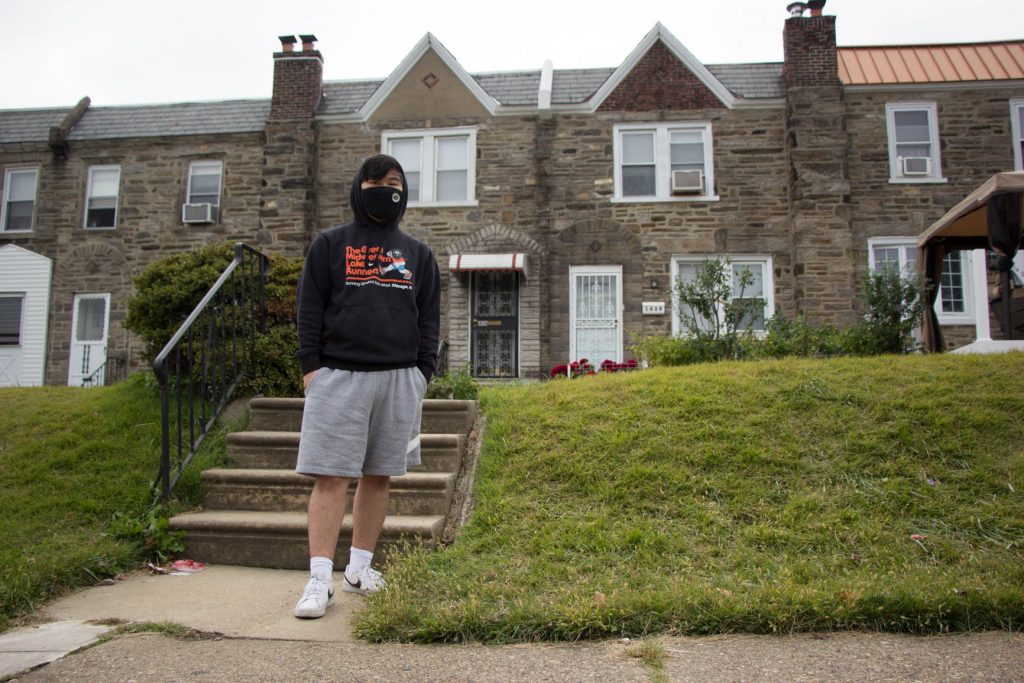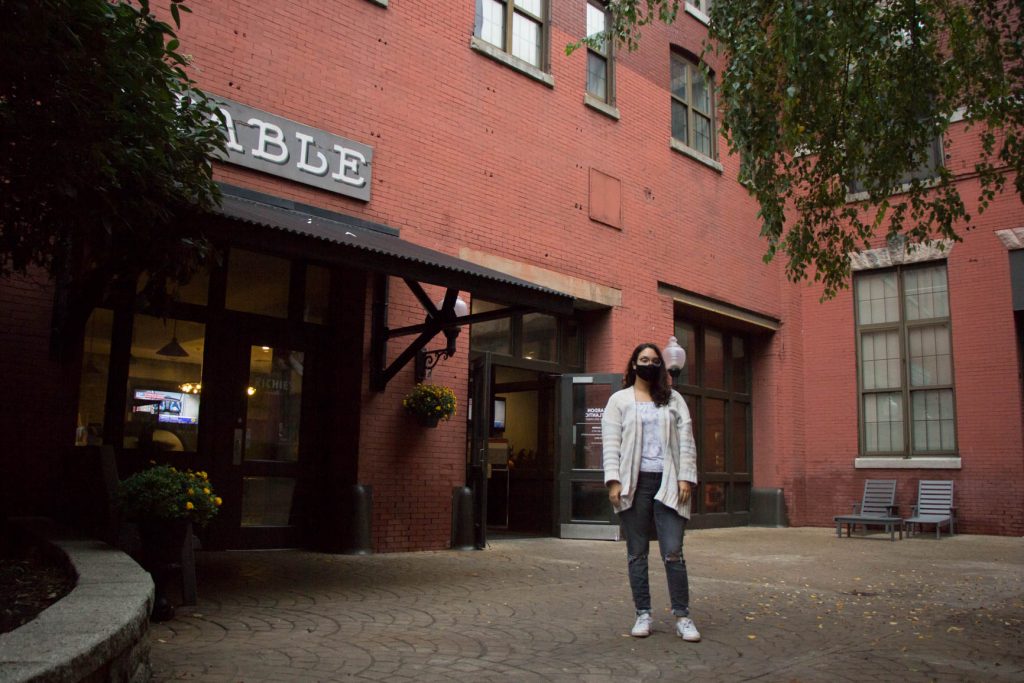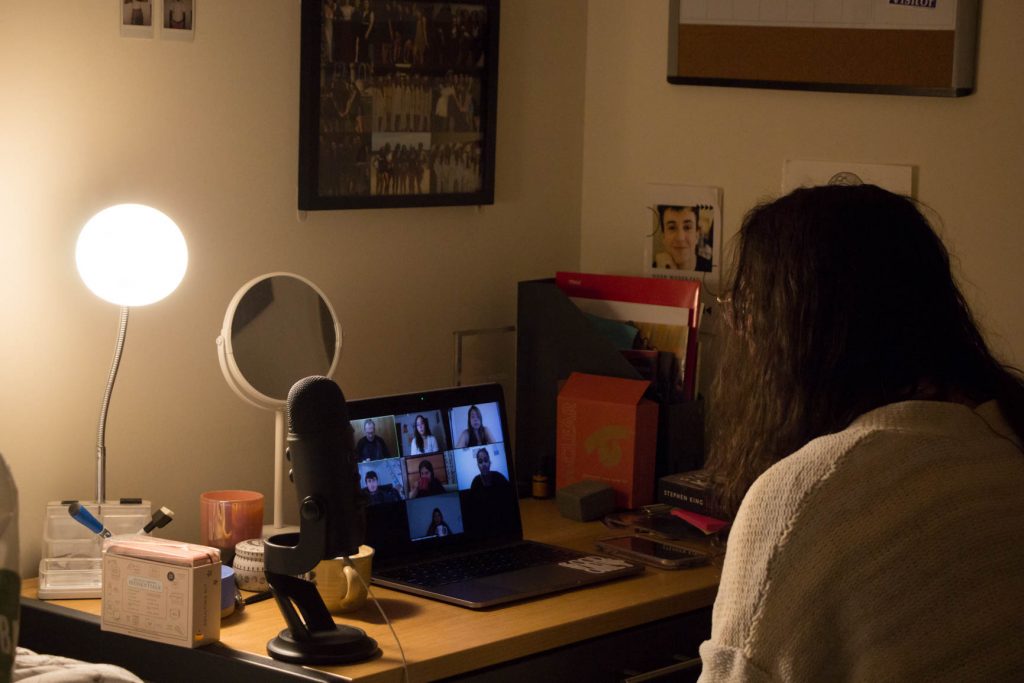
ADAPTING TO THE ENVIRONMENT
Joshua Chun, a junior history and political science major, found ways to refocus and thrive in a semester as busy as ever.

oshua Chun didn’t get out much this summer.
Living with two parents, three siblings and two grandparents, Chun worried about catching and potentially transmitting COVID-19 to his family members and chose to stay indoors, continuing to see friends virtually.
Registered for some in-person classes at Temple University at the beginning of Fall 2020, Chun, a junior history and political science major, worried how commuting from his Oxford Circle home and being on Main Campus for his classes would affect this risk.
“For people living with their family, they’re just scared about what they might bring home,” Chun said on Aug. 23. “Even when I’m going out now, I’m terrified of that.”
The COVID-19 pandemic shrunk Chun’s world to the confines of his bedroom in a cramped Northeast Philadelphia household. Throughout the semester, he wrestled with loneliness and difficulty focusing on his schoolwork while living with his extended family at home. At first, avoiding seeing anyone outside of his house, Chun slowly branched out and adapted to new ways to be social and explore interests in safe in-person settings.
Chun describes himself as an outgoing busybody, filling his schedule with social time with friends and a variety of extracurriculars on top of a large course load. A transfer student from Penn State Abington, Chun had always wanted to attend Temple, where both his parents went to school because he loves the city of Philadelphia.
He began the semester with four of his six classes in person, the most in-person classes among his friends. Chun planned his class schedule based on degree requirements and their professors before he knew if the courses would meet virtually or not.
Chun felt bittersweet, yet grateful about Temple’s Sept. 3 announcement that all nonessential classes would move online due to rising COVID-19 cases among students. On the one hand, he enjoyed seeing and connecting with his friends and coworkers in person on Main Campus. But when classes were face-to-face, Chun worried about bringing the virus back home, regularly showering after his daily commute on public transportation.
“I thought like, ‘Oh yeah this is nice’, but at the same time, I’m risking my family’s life, I’m risking my own personal health,” Chun said on Sept. 3. “It just felt like a constant worry in the back of my mind.”
After classes moved online, learning from home presented its own issues for Chun, especially in a cramped household with seven family members. Although his parents were understanding and did their best to make sure Chun had his own space, finding privacy to attend Zoom classes or get homework done was a challenge, with two of his siblings also attending college classes and his parents and another sibling working from home.
“It’s just kind of hectic considering everybody needs a computer and everyone needs a space, and I’m kind of just left, like, leaning over my laptop on my bed,” Chun said on Sept. 13.
Chun found it difficult to stay focused as the semester neared closer to midterms. For him, the prospect of spring semester classes being in person was what kept him motivated in his 18 credits of fall coursework. But as the COVID-19 pandemic showed no signs of slowing down with cases climbing in late September, and the possibility of Temple having another semester online felt likely, Chun struggled with confronting the reality of a mostly-virtual junior year.
“It’s been really weird,” Chun said on Sept. 30. “I don’t think anything right now is, like, really stable.”
Then, for the first time since March, Chun began seeing a small group of friends in Northeast Philadelphia and Center City in October. Although Chun limited his interactions to small hangouts and walks outside, and he accepted the fact that he would likely have to stop seeing people as the weather grew colder, he still appreciated the chance to connect with others in person, especially on his 21st birthday on Oct. 18.
“We watched a couple NFL games on, and that was pretty much it,” Chun said. “But it was a nice birthday, I have nothing to complain about.”
He got another opportunity to branch out of his household when he joined President-Elect Joe Biden’s campaign as an intern in late October, where he began encouraging college students to vote. Although his interests lie more in local campaigning, Chun was excited about the prospect of helping remove President Donald Trump from office in November.

But Chun felt anxious and pessimistic leading up to Election Day, feeling that even if Biden won, people would disengage from being politically active and not press him on progressive issues.
“I’m really hoping people understand like, even if Biden wins, like there’s so much left to do,” Chun said on Nov. 2.
When major news outlets announced Biden secured the presidency on Nov. 7, Chun was relieved, but felt disappointed that Biden’s margin of victory was “weak.”
“At least we have a decent president,” Chun said on Nov. 7.
Into November, Chun continued to see friends in Northeast Philadelphia, hanging out masked-up in his front yard or at parks near his house. But with Philadelphia issuing a wave of new COVID-19 restrictions beginning Nov. 20 and finals season around the corner, Chun decided to stop seeing people outside of his household later that month.
As of early December, Chun wasn’t sure when he would start seeing people again, but said he wanted to see COVID-19 cases decrease and people he knew start receiving the vaccine before he became comfortable with it.
“I just want to be as safe with this as possible,” he said on Dec 14. “I’m not trying to be that person to kind of, like, endanger myself or people around me.”
As his finals wrapped up, Chun felt “okay” about his academic performance for the semester, especially considering the amount of extracurricular work — his internship and the mentorship program he works in — he took on. He felt “barely prepared” for some of his finals and found himself especially busy trying to close out the semester.
But Chun didn’t cut himself short. To have completed all of his assignments and survived a semester as tumultuous as Fall 2020 is “A+ work” in his view, and he’s proud of where he is today.
“This is probably, like, one of the hardest semesters to go through school work for,” Chun said on Dec. 14. “It definitely shows growth and it definitely shows the ability to, kind of, adapt to the environment.”
At the same time, he resents having had nearly a full academic year virtual after transferring to Temple a year and a half ago. With none of his classes scheduled to meet in person in the spring, Chun might not have a full academic year in person until his senior year. Naturally, a part of him wishes the pandemic would’ve eased this fall so he could’ve been on campus, spending time with his friends.
“But I’m glad I went through this process and just dealt with it the way I did,” he said on Dec. 14.



